Article content
As more and more organisations embrace remote working, the question of work-life balance becomes crucial. How do you keep a healthy separation between home and work when the two collide?
Dr Timothy Bednall is an organisational behaviour and human resources expert, as well as a senior lecturer in the Department of Management and Marketing at Swinburne University in Victoria. He defines a problematic work-life balance as one or all of the following:
- too much work or unfulfilling work
- too much stress – the demands of the job exceed the resources and time the employee has to perform it
- poor recuperation from the role’s demands, or the inability to stop worrying about work during non-work hours.
To get remote workers to strike the optimum balance, Bednall is an advocate for HR departments stepping in from the outset. It’s an HR issue, he says, because bad habits around work-life balance can be detrimental to both job performance and employee wellbeing. And these bad habits are often exacerbated when working remotely.
“Working from home carries with it a couple of risks,” Bednall says. “The first is the psychological impact of loneliness. Another risk is poor detachment from work, making it more difficult for teleworkers to relax during their non-work hours.”
Help from HR
Bednall outlines several “pressure points” HR departments need to cover, such as:
- ensuring OHS requirements are met,
- establishing remote-working guidelines and workflow procedures,
- facilitating training for any new programs or digital collaboration tools required.
HR can also be instrumental in the transition to remote working and dealing with any concerns from staff or management.
“The fear many managers have is that employees won’t be as productive and will be distracted by things at home,” Bednall says. “So, there’s a concern about keeping employees accountable.”

Healthy boundaries
HR also has an important role in helping employees to set and maintain a healthy separation between their home life and the job. Bednall says a good starting point is to establish different “zones” in the home dedicated to work and other activities. He strongly advises against working from bed.
“The idea is to associate each part of the home with completely different activities,” he says. “Bringing your work into your bedroom is a recipe for insomnia and poor recovery from work.”
Setting goals
Another area HR can assist with is goal setting. Here it may be about switching to goal-oriented outcomes to provide remote workers with more flexibility.
“Ultimately, it doesn’t really matter if employees become distracted throughout the day or undertake other errands, as long as they deliver their expected work.”
- Dr Timothy Bednall
Altering attitudes
Bednall says HR departments can lead organisational change in attitudes to remote work by demonstrating the value of healthy boundaries, encouraging people to take breaks and ensuring they are not expected to respond to communications outside of agreed working hours.
“HR plays something of a role in building an organisational culture that encourages employees to set boundaries and respect them,” he says. “I think it’s very important for individuals, perhaps aided by HR and/or guidelines, to set psychological boundaries between their work and home life, even if both are physically located in the same place.”

